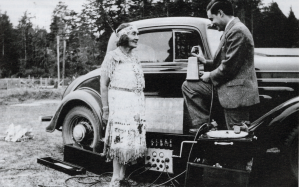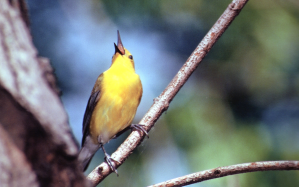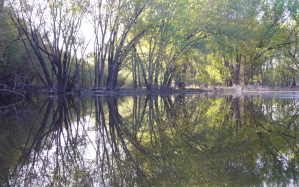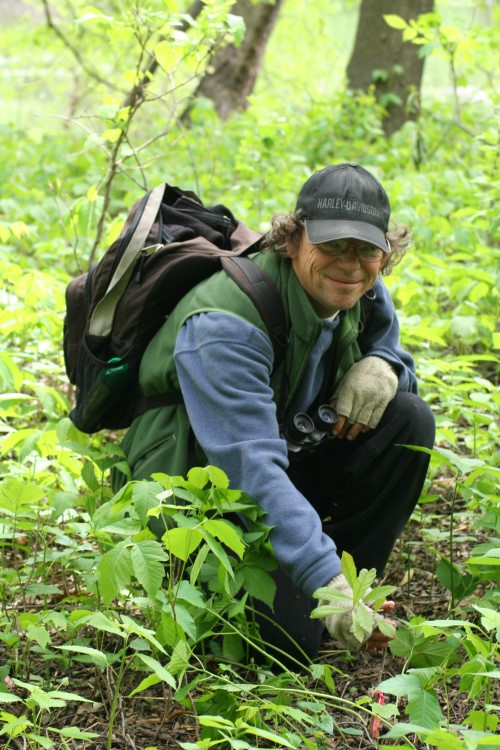EDEN NEVER HEARD
(Copyright 2013 by Richie Swanson)
Wilde Literary Journal Fall 2013
I arrived in St. Louis on a steamboat, determined to winter at an inn and find passage up the Missouri in spring and wholesale goods to settlements that were booming on the way to Oregon country. But the same afternoon I landed, Captain Charles Dunaway docked the Glory at the levee, and I queried him about shipping rates, and he took me into his cabin and confidence. He knew of a bench of shoreline upriver in Minnesota Territory, a town-site opening, Sioux Prairie, and he said he needed men to preempt and hold claims until Congress ratified a treaty that would secure the Mississippi’s west bank from Dakota Indians.
I boarded the Glory, and a few weeks later Captain Dunaway dropped me off with his brother Gordon and three other men at Sioux Prairie, and turned around. We staked out five claims for ourselves and roped off the best landing site for Captain Dunaway. We each built a claim shack, and one morning lumber floated down the Mississippi, loose from some raft, and Gordon and I waded in and pitched boards gleefully onto land–white-pine joists already milled. Worth three-bits apiece. Free for the taking. But we shivered in the November water, exhausted, and suddenly Gordon shouldered a joist jauntily and charged ashore. A new claim shack had risen on his brother’s landing site, and a dark-looking half-breed–fifteen or sixteen-years-old–squatted on the roof, fitting a stovepipe.
“Hello gentlemen.” The lad smiled fluidly, long black eyelashes curving silkily above soft chocolate eyes. “I’m Dorilus Knox.”
“This claim belongs to my brother,” said Gordon. “He’s in La Crosse, acquiring flour.”
Dorilus looked at the four shanties upriver. “Everyone here says Captain Dunaway’s never occupied this claim.”
I caught Dorilus’ eye, raised a hand, but Gordon swung the joist. Roof-boards crashed, Dorilus fell, and Gordon flung him away, two-heads taller, a bear man-handling a cub. Gordon leapt upon Dorilus, punching his head, and then Gordon screamed, his right hand bleeding between Dorilus’ teeth. Dorilus bulled Gordon backward, Gordon blanched and fell ghost-white. Dorilus spat blood, lurching at me, and I raised my palm again, and he knelt and pressed a kerchief against Gordon’s thumb.
Erwin arrived from the adjacent claim, brandishing an ax. “Did the sod cut him?”
“No,” I said, and we carried Gordon to Erwin’s shanty and laid him by the stove. Dorilus unbuttoned him, and I snuck looks at the lad, feeling pained, captive. Joseph whom I had loved in Zurich, who had owned warehouses with me, had been pressed to death in a bale of coats, and I had come to America to marry a wife and forget the polizei unrolling the bale and revealing Joseph and the gouge between his legs.
Dorilus drew blankets to Gordon’s chin, washed and salved his thumb tenderly. He rubbed whiskey on his chest gently and fed him raccoon stew, holding a spoon with fingers as lovey as Joseph’s, and I saw in him what any man such as I would hope.
And later I found Dorilus alone, watching the river in the last crystalline light before dusk, a heavy white mist above silvery-blue water, ice crusting, tinkling, and Dorilus so quiet and rapt that I wondered if what Captain Dunaway had told me about Sioux Prairie were true, that birds here in spring sang more of Eden than even God heard, and the site’s beauty would someday be surpassed only by its wealth.
“You’ve had schooling?” I said.
“And you, money?” said Dorilus.
He showed me his dugout hidden beneath the bank, and we launched downriver and passed Sioux huddling around fires on islands, waiting to be moved west, geese cackling in the sky, flying furiously south. But Dorilus had no hurry against the cold. The mist swallowed us, frosting my face, and the dugout was so tiny he arched his legs and snuggled my hips with winter moccasins, and I reclined into his hands, feeling heat as hungry as my own. I was twice his age, had loved no one since Joseph, and he stroked my cheeks, the river breathing a thick-dark veil around us.
At dawn we arrived at the La Crosse landing, the Glory frozen in a rim of ice there. We climbed to wooden sidewalks—Wisconsin had been a state four years–La Crosse had frame houses, fences around lots, smithies, a railroad coming.
Dorilus spoke with a confidence beyond his youth, “Yes, of course, we ourselves will also sell flour.” He wrote a list of dry goods in a precise hand and led me to the back door of Lute Ulrich Mercantile, where a bald-headed chap welcomed me in Swiss German. His wife brought chocolate in china cups, and Lute perused the list, and his eyes twinkled through gold-rimmed spectacles at Dorilus. “You’ll pay in logs?”
Dorilus smiled yes–Lute had known Dorilus’ father, had supplied Spencer Knox’s mill and pinery camps thirty miles up the Black River until Spencer had caught the croup and died in a day. The storekeeper ushered us upstairs and winked before leaving us alone. “I trust this lad. I credit him like gold.”
Dorilus and I settled into a back-corner room with a sheet-iron stove and a single tick stuffed with swamp-grass.
“I could not name my mother,” said Dorilus. “The justice ruled I was not an heir to my father’s properties.”
“Your mother was Sioux?” I said.
“The Indians up the Black are Winnebago.”
“She was that?”
“Don’t know.”
“Ojibwa?”
“Don’t know.”
“French?”
He tittered, the beautiful brown devil.
* * *
A fist pounded the door in the morning. Captain Dunaway shouted, “Mister Kountz! Nicholas Kountz! Open up!”
I cracked the door, and Charles swelled in a velvet-collared coat, arching his Scotch-Irish eyebrows commandingly above an icy-blue glare. He saw the body beneath bed quilts and frowned repulsively. “You have a woman in there?”
Dorilus sat up in his night shirt, and Captain Dunaway eased his countenance—men commonly shared beds on the frontier, an undeniable necessity.
Dorilus stood and grabbed the chamber pot. “Please, sir.”
The captain glowered at his brown skin, “Who is this?”
I pushed out the door, drew Dunaway down the hall, and he whispered angrily, and I told him, yes, his Sioux Prairie claims were intact, and no, I would not help him haul flour there. His face shut down testily against his beard. “Why, he’s Spencer Knox’s boy!” he said, and banged brusquely down the stairway.
Dorilus had been raised white, not Indian, and we dressed in frilled shirts and formal coats and strolled out to the riverfront, where the water now appeared solidly frozen. Dunaway’s clerk Luther McKinney loaded provisions from the Glory onto a carry-all, the captain was harnessing a two-horse team, and Dorilus looked at the two men as if they were fools. He walked onto the ice and swung an oak club against it, and the ice twanged, and Dorilus showed no hurry again, only his beautiful smile. We stayed two more nights in our back-corner room, and when Dorilus rose before sunrise and left for the stable, I felt a vacancy that ached unbearably in me until his steps finally returned again in the hall. And then we drank to the oxen Dorilus had procured, the only two available in Crawford County, Bliss and Bane. And I showed Dorilus how to gather kirsch around his tongue and allow the nuttiness to wallow, even though the cherry liqueur failed to wash away my doubt—we had, after all, granted Captain Dunaway a two-and-a-half day start to the landing site Dorilus wished to claim, and had given Dunaway the first chance to sell dry goods to Erwin and the others at Sioux Prairie.
* * *
We loaded our own carry-all on the ice, rode about ten miles and saw a slash of blue water, a mare dead on ice. Captain Dunaway came out from a wooded shore, and McKinney waved distraughtly, his left arm dangling crookedly. Dunaway hailed Dorilus, and Dorilus abandoned all caution, marching directly to the hole in the ice. He stripped to his drawers and jumped in feet-first, and I waited with Bliss and Bane, dumbfounded. Dorilus did not come up, and Captain Dunaway and McKinney knelt, screaming into the water. “No, it’s too heavy to lift! Cut it!”
McKinney handed Captain Dunaway a knife, and Charles slid in, and I grabbed blankets, a rope. I ran shaking, panicking. I arrived as Captain Dunaway pushed Dorilus out of the hole, and I steadied Dorilus as he caught his breath, vomited, coughed.
Captain Dunaway went under again. He crouched in water as clear as a lake in the Alps. He hunched, cutting a saddlebag, and he surfaced and tossed out Yankee schillings–each worth two and one-half bits.
McKinney scooped them onto a blanket, barking excitedly, “The bags fell in when the sled went through! I tried to grab ‘em! Smashed my arm!”
“A harness caught my foot down there,” said Dorilus.
Captain Dunaway surfaced again, dropped more schillings onto the ice, and Dorilus shrieked, jumping in again, and then he and Captain Dunaway came up with four fistfuls. I shed my cloak, and McKinney glared like a peasant who would never get out from under. His eyes begged me not to leap, I jumped in.
Charles, Dorilus and I squatted at the bottom, groped beneath the bags of schillings. We heaved each bag together. We shoved them out and ran on the ice, screeching giddily, snow stinging our feet, drawers freezing against our flesh. We guzzled whiskey around Captain Dunaway’s fire, and McKinney piled on slash, his coat filthy from gathering it.
“Oh, boys,” said Captain Dunaway, “I’ve had those schillings since I came from Pennsylvania.”
“Mister Kountz and I deserve half,” said Dorilus.
“I saved your life,” said the captain. “You owe me. I’ll pay you for the use of your cattle and sled to Sioux Prairie, and after you get my goods to Gordon, I’ll pay you by the day to hold my landing and chop cordwood. Luther can’t do it now. His arm’s broken.”
“Sprained,” said McKinney.
Dorilus’ smile broke slowly, amiably. “I own that landing, captain. You weren’t on it, and I built a claim shack.”
“You’re not old enough to file a claim.”
“I will be by the time a land office opens in Sioux Prairie.”
“You’re not a citizen, never will be. It’s my landing, and I’ll build a mill on it.”
“Partner with us, captain,” said Dorilus. “I’ll show you a season’s worth of log rafts free for the taking—two-million board feet, maybe three.”
The captain grimaced no, and McKinney groaned, rocking in anguish.
* * *
Captain Dunaway walked McKinney back to La Crosse, and Dorilus and I packed Bliss, Bane and a mare and drove all the goods to Sioux Prairie. We unloaded Charles’ goods at Gordon’s shoreline, and Gordon nodded huffily at the landing site.
Dorilus grinned readily, “You keep the captain’s goods at your claim, not mine, and I will show you and your brother something that will pay the carpenters to build our mill here. It will pay for the saws and steam and stock. Two million, three million board feet.”
We waited ten days, improved Dorilus’ shanty, built a storehouse on my claim, and then Captain Dunaway arrived with draft horses, and we left the other claim holders at Sioux Prairie. We hugged the Wisconsin shore, riding upriver in breezeless sunshine, and snow melted and glistened on rocks in gullies, and I thought of Valais, Joseph sauntering beside snow-capped boulders, his smile resplendent in his mountaineering garb—Joseph had smiled without hurry, glowing with pride and promise after we had climbed the Matterhorn that fine day so many years ago.
Dorilus glanced at me searchingly, and I waved to indicate the expanse of the Mississippi’s valley, pinelands ahead, our destiny of owning mills together. He deepened his look and turned our horses into a stinging gust, the air suddenly frigid. Clouds of snow howled down the frozen channel, and Dorilus dismounted and thumped his oak club against the ice.
“No, I’ve piloted boats on this reach for ten years,” said Captain Dunaway. “The draft’s too shallow here for a steamboat.”
“Listen.” Dorilus thumped the ice again. “Hear it? The Glory will fetch three and one-half feet here even in low water.”
“No,” said Captain Dunaway. “We’ll float our log rafts here with oarsmen, not steam.”
Dorilus winked at him gaily, “The Glory’ll float five rafts at once here.”
We rode into the Chippewa River’s delta. We slept on beaver furs and pine boughs, in eider-down blankets, the Chippewa’s ice belching, quaking all night. The ground buckled, and we woke to trees swaying dizzily, stars shimmering at twenty-below.
“If you’re wrong about your El Dorado, you’re a criminal, and I’ve been bamboozled,” said Captain Dunaway.
“I gave my word,” said Dorilus. “The army logged pine up the Chippewa years ago. They started to float rafts downriver, and the rafts got snagged and broke apart. The army went home to Fort Crawford and never came back. I saw the jam last fall.”
“Last fall?” said Gordon. “You know you must maintain truth before your neighbors now, always. You cannot bear false witness.”
Dorilus stared skyward, peeved, his silky eyelashes flicking. Gordon leveled his voice, “If you two join the Dunaway Log Company, you must serve more than yourselves. You must record every cent you spend. All of us must give land for churches and schools. Nobody works on Sabbath Day.”
“Gordon’s going back to Pennsylvania for a wife next winter,” said Captain Dunaway. “You boys can go along.”
Dorilus dropped wood sullenly on the fire.
“Indeed I would love a wife,” I said. “When I have built my house, I will write Switzerland.”
* * *
We breakfasted on red squirrel and biscuits and rode half the morning through bottoms, and then the frozen logjam rose cockeyed from the river-ice, stretching for miles up an immense slough.
“Eureka!” cried the Dunaways.
Dorilus swung an ax into heartwood, and the dust smelled dry, rich for milling. “You put our names on the charter of your mill and raft company like you promised,” said Dorilus. “If the water gets as high as that flood-ring over on that maple, we’ll break the jam with hand-spikes and cant-dogs. Otherwise we’ll use dynamite.” He pointed his ax at a path he saw through river trees. “We’ll cut a channel and line it with spar-poles. We’ll float the logs through and tie rafts against an island.”
“Knox Island,” said I.
Captain Dunaway nodded acquiescently, and Gordon pulled from a leather valise a stack of Congressional certificates—hundreds of land warrants issued to soldiers who had fought Santa Anna in Mexico–one-hundred-sixty acres apiece, valued at five bits an acre—but bought back east by the Dunaway’s father at three bits per acre, from men unwilling to come west.
Dorilus and I copied the land warrants for an entire day, and next morning we dropped to our knees and recited with the Dunaways, “Oh, Almighty God who hast commissioned angels to guide and protect us from our setting out until our return, to clothe us with invisible protection…”
We said amen, and Captain Dunaway gave us a long, calculating look. He and Gordon turned toward Sioux Prairie, and Dorilus and I rode up the Chippewa to Eau Claire—nearly the size of La Crosse—its land office a little clapboard shack. Dorilus reached for its door, and Luther McKinney came out, plat books under his good arm. “Your lords order you here?” He smirked and shuffled past with a narrow-nosed compass man, and they disappeared toward the river, calling to sled dogs.
Dorilus chuckled, “Working for Stanchfield and Nelson. Cruising timber like us.”
We went in, ordered the same plat books, and the clerk studied us, deliberating, chilling me with the same lingering gaze as Captain Dunaway—McKinney knew and had told the clerk—the Dunaways would tell all of Sioux Prairie—Lute Ulrich and his wife also knew.
“No, nobody knows.” Dorilus poured steaming water down my back in the tub at the hotel, soaped and rinsed me. “If the Dunaways knew, they wouldn’t sign papers with us.” He paced about nimbly, his leanness crackling against his gown, his eyes sparkling in stove-light, his lovely lashes shadowy. “We’re rid of them until spring,” he smiled.
My skin tingled, my lips thirsted. My heart sorrowed and feared.
* * *
We rode up the Chippewa a day and one-half, stabled the horses for the winter at Johnson’s Ranch and walked inland in larigans and snowshoes, pulling a freight toboggan along Jump Creek and finally into the real mother lode, white pines, blazes on trees and section posts. We arrived at a camp that had been abandoned after Spencer Knox’s papers had been discounted, and we stooped into the bunkhouse—a thick frost on crude benches and bed-planks, only a sandpit for a hearth, no stove or chimney. I held my tongue, for Dorilus thought we’d locate many of the Dunaways’ warrants very near, and we’d spend a profitable winter here, estimating board feet and planning cuts.
“I’ll not do what Father did,” he said. “I’ll register all claims in order.” He stared closely at me, showing a great need.
“Certainly,” I said.
He blinked painfully. “You don’t believe me.”
He turned, and my heart leapt after him. “Listen, Joseph, please!” He gawked. “Dorilus, you’ll do it by your beauty alone.”
He tapped a glove against his capoté’s hood, suddenly amused, meaning his noggin would pull us through, make us rich. He forgave me instantly and tromped out to look around, and I bent down and lit kindling, and bang!
I found Dorilus lying outside in snow, his face powder-burned, smoke hanging between pines. “Am I hit?”
I tore open his parka, no blood, and Dorilus gazed at a cord he had tripped upon, and at a muzzle loader mounted on a forked stake.
“McKinney,” I said.
“Not necessarily.” Dorilus shook himself and wobbled to his feet, recovering from the powder blast. “Loggers set guns like this for deer. Someone likely heard us coming and left quick.”
“The Dunaways knew we would come here.”
“No, no need to hide any crime out here. No witness, no law, no trouble. A man does what he wants.”
He kissed me lavishly, clinging heavily, his weight tottering woozily.
* * *
Dorilus lit morning fires in the dark, worked the fire-irons gracefully, silently, feline-like, and traipsed over the tree-trunk bridge across Jump Creek dauntlessly. He climbed slopes colt-strong and paced forties soldier-serious, his gaze absorbing pines, subtracting balsam, spruce and hardwood. He spoke his estimates, and I secretly surmised my own—not instinctively as he did, but counting the sixteen-foot lengths in each pine at four-rod intervals, four-rods deep, multiplying, arriving sometimes at ten times more board feet than he.
I merely raised my eyebrows, played along, and he said nothing until one midnight we finished our love beneath our eider-down, and I nestled my head on his shoulder.
“Everyone underestimates the timber in their tracts,” he said. “Nobody wants the land office to charge them more than the other guy.”
“Nobody checks?”
“Everyone eats from the same table, sleeps in the same bed.”
“Nein,” I said. “Falsch.”
“We’ll build a lumberman’s mansion,” said Dorilus, and he fell peacefully asleep.
* * *
The air warmed mid-March, and we cruised our way back to our camp. We arrived at twilight and found Jump Creek very high, boiling beneath the tree-trunk bridge. Dorilus crossed it, and it bowed down in the middle–damp yellow sawdust on the underside–another cruiser had doubtlessly doctored the bridge and had started to Eau Claire to register our tracts before us.
Our dugout was gone, surely stolen, and we set out in pounding rain, mud gurgling beneath our feet. We gained the Chippewa before morning, and she was roaring a few feet from Johnson’s barn, his cabin swept completely away. Johnson himself was nowhere, his barn empty of stock, and we pried hewn timbers from it. We laid them square, and Dorilus roped them corner to corner, stern to aft. He tied knots for oarlocks and lines for holdfasts. I boiled pitch in a pail and poured it between our raft’s timbers, and his silky lashes inched daintily down, and his eyes lit triumphantly at the waterproofing.
We launched the raft downriver and soared around several bends, skidding across cataracts. I was thrown suddenly high, tossed by a thundering spray. I clung to a holdfast, landed hard on the raft on a logjam. I lay with my teeth throbbing, and Dorilus seemed to shout, “The compass man! Dead!” Dorilus hunched on the jam beyond the raft–and flew backward. McKinney rose, his face bleeding, eyes bugging out. His good arm wielded an oar, he poked Dorilus hard. “Don’t touch me!” shouted McKinney. “God knows what you are! Everyone knows–sinners! Filth! Defilement!” Dorilus lay unmoving, staring up at McKinney. “You’re mistakes!” McKinney raised his oar, eyed Dorilus’ head. “You dance and parade before your lords, and God will send his bullet!”
I shouted, my jaw failed. McKinney swung, Dorilus shuffled. Logs shifted, and the oar lay by itself, no McKinney, no compass man either. I blacked out, and when I woke again, Dorilus smiled above me and pulled me up from the raft. We stepped ashore, and he led us without hurry along ridge-lines to Eau Claire’s land office.
* * *
The Chippewa got higher, muddier, greener as her bottoms leafed out. We floated logs by the thousands through the slough above Knox Island, and I tallied them while walking on booms while Dorilus balanced himself on a single floating log, poling effortlessly through our watery camp, his feet poised as if to effect a jubilant jig.
He axed boughs from river birches, and the rafts-men he’d hired laid them across crib-corners. They hammered oak staples Dorilus had designed, and tied our log-string five-cribs long, corner to corner, exactly as Dorilus instructed. My jaw felt better every day, but the morning the Glory blew her whistle, I was seized by a hollow chill.
A skiff landed the Dunaways at our string, and Gordon whistled, admiring Dorilus’ innovations. Gordon watched him sidewise and pawed his beard warily, and Captain Dunaway pumped our hands robustly and then rubbed his fingertips as if to shed the feel of us.
A rafts-man hollered up-slough: “McKinney!”
The body lay before us presently—mud-drenched, bloated, putrefied.
Captain Dunaway barked boorishly at us, “Did you two see McKinney in the woods? Or on the river?”
“No!” we said.
“Lord Jesus.” Captain Dunaway gulped visibly. “Get a coffin built. Call the minister.”
He paled and returned to the Glory. Later he called us to dinner, and talked only of the Sioux Prairie mill, Chicago capital, saw-blades and boom leases.
Dorilus and I canoed mutely from the Glory afterward, and I fired our bathwater in the office-shack we had built on our raft. “They’re spooked, repulsed,” I said. “They’re torn. We have one raft ready and four-million board feet stored. They’ve paid nothing yet. They’ll buy us out in a second.”
Dorilus shook his head firmly no, and fear set me to wiggling all night.
* * *
Dorilus put on a scarlet shirt at daybreak, a neck scarf water-lily yellow, a new slouch hat, sleek pantaloons, snow-white gloves. He laced his high-toed boots and said, “Captain Dunaway’ll see. He’ll pilot our timber raft just like I said. The Glory’ll have her three and one-half feet of draft and triple it.”
We readied our first string of logs, and the windlass on the Glory winched it to her bow. I climbed into the pilothouse with the Dunaways, and watched Dorilus prance down at the head of the logs, waving his yellow scarf, signaling to his rafts-men. Captain Dunaway steered, backing the Glory behind four more strings, and a shot popped. Smoke rose from a wooded bank. I started reflexively. The Dunaways steadily eyed the raft.
Dorilus snapped his scarf. Another shot. “Turkey hunt,” said Captain Dunaway.
Another shot, and Dorilus stumbled down on the raft. He bounced up, grabbed and pulled a line. I trembled terribly. I hastened below, and as Dorilus worked the line, I wrapped my hands with his. We pulled together, the entire raft nearly set, the Mississippi swollen beyond the Chippewa’s mouth, hissing and thumping a din. Dorilus poured me a look, demanding calmness, confidence. My boy, I thought, my beautiful river boy. He waved his scarf with a flourish, and the Glory shifted against the raft and swung it five-strings wide, smoothly, into the Mississippi. Tears welled uncontrollably in my eyes, and a shot popped again, smoking from the Minnesota bluffs. I spun willfully.
Dorilus did not necessarily dance before his lords. He stood smugly on the raft, Joseph at Valais, and I moved un-noticed across the raft and back onto the Glory’s deck. I would not live or witness it again. Everyone watched Dorilus, you see. Nobody saw the powder smoke along the Minnesota shore, the easy rifle range.
I leapt from the stern, past the paddlewheel’s wake. The cold water clutched me. I came up, the red paddlewheel already spinning distantly, the Glory running at flood-pace.
I was yanked under, was shoved forward head-over-heels. I kicked and swam up again, and I fanned my arms, floating backward, and a deadfall approached sidewise, its root-wad and crown huge. I ducked, plunged, wrestled my breath, was finally pushed ashore below a line of steamboats and caravansaries, Read’s Landing. I lay on sand, sobbing, hating my misery. Flies swarmed me, biting savagely, and I heaved myself up. I walked toward town, and hooves pounded behind me, a horseman shouting. “Man shot!”
I whirled. The road was empty, only mud-holes and wagon-ruts—no one shot, no one there.
No, no one there.
A stagecoach sat outside a shack in town, and a placard on the station’s door spoke my discretion:
Dakota Territory Opening
Free Land for White Men
Wives for Sale
Dutiful, Affordable, Reliable.










